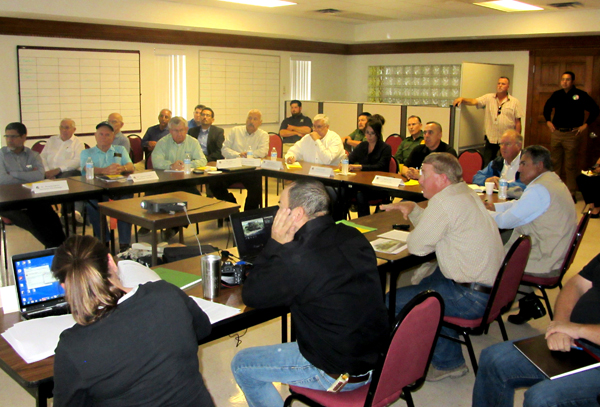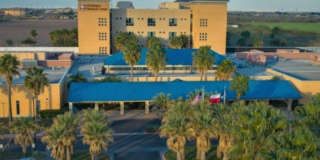- La Feria Native Soon To Retire From The Military This Summer
- Senior Eneece Avila Takes Pride in her State Title
- Dr. Noemi Infante, Harlingen Medical Center Open New Women’s Clinic
- Santa Rosa Cameron County Park Partially Reopens
- Santa Rosa Takes to Regionals Meet in Kingsville, Tx
- Long-Standing Nexstar Tower in La Feria Decommissioned
- Lionettes Powerlifting Meet
- Local Business Holds Event to Benefit RGV Shriners Club
- Knights of Columbus Holds it’s 30th Annual Golf Tournament
- KGBT Tower Dismantled
Citizens Forum Hears Latest on Water Management
- Updated: February 17, 2017

Public Forum Speakers Grady Engelking, Listo Services; Juan Uribe, USIBWC Co-chair; Tori Kuczmanski, Public Affairs Officer, USIBWC speak before a crowd of citizens. Photos: Bill Keltner/LFN
“We’re in better shape today, but still much to do”
The November public meeting of the United States Section of the International Boundary and Water Commission highlighted matters of concern to a wide range of South Texas interests. The agenda covered current efforts to restore the flood conveyance capacity of the Arroyo Colorado in Harlingen and an overview of mussel species in our region.
The well-attended quarterly meeting took place at the USIBWC Conference room in Mercedes. Valley farmers, law enforcement officers, environmentalist groups and interested citizens heard a panel of top executives speak on their specialty.
After the customary welcome and introductions by Juan Uribe, Citizens Forum CoChair, the meeting got underway with a Power Point presentation by Grady EngelKing, Manager of Listo Services, a company contracted to restore the flood conveyance capacity of the Arroyo Colorado.
In his remarks, he stressed that his crews were very cognizant of the need to clear the brush and trees, but also the need to protect the native vegetation and endangered animals species. “We will also protect selected, historical trees,” he said. “They will be spared and left in the flood plain.” The speaker explained how the Arroyo Colorado, which flows through Harlingen, is an important component of the Lower Rio Grande Flood Control Project’s flood conveyance system. “During Rio Grande flood conditions, some of the floodwaters are diverted off the river into inferior floodway channels in Mexico and The United States, including the Arroyo Colorado. Our work is vital to keep the waterways clear of detrimental brush and vegetation.
Engelking said they still have a way to go on this project, but they are on track to restore the native natural habitat and wetlands, while protecting the environment and natural beauty of the area.
Speaker Greg Binton, Biologist with Inland Fisheries of the Texas Parks and Wildlife department, spoke on the disconcerting decline is the native fresh water mussels. “This gradual decline concerns us because these mussels are a good indicator of water quality and overall health of the water supply in the Rio Grande,” he said.
“Mussels are at risk to decline due to sensitivity to poor water conditions,” he continued, adding, “There are 52 species of mussels in Texas, 68% are rated at “in peril’ or “vulnerable,” but, an even greater challenge to mussels is a foreign “Zebra” mussel that was first introduced into Texas in 1988. This deadly invader now presents a dangerous threat coast-to-coast to our native, beneficial mussels. We are working on the problem.”
The productive meeting closed with suggestions for future agenda items including the concerns of law enforcement officers who daily live with the reality that illegal traffic from across the border takes advantage of river brush to stash drugs, people and threaten Border Patrol officers enforcing the law.








